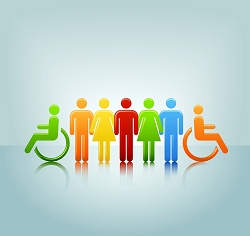 The Equalities Act 2010
The Equalities Act 2010
The last government made determined progress in achieving its vision of a fair and equal society for all and set the benchmark for domestic equality practices in Europe, building on the anti discrimination laws of previous successive governments to create and respond to changes in society and to promote civil rights and equality.
GEO pulled together evidence on the needs of different groups; women, disabled, older people, ethnic minorities, LGB&T people, and the views of different religious and belief groups, culminating in the Equality Act, which became law in April 2010 and is an essential part of the new government's driver towards a more equal society.
The Equality Act simplifies and harmonises existing law by replacing nine major pieces of legislation with a single Act, and introduces a range of new measures which will strengthen protection and support individuals to fulfil their potential, whatever their age, race, sex, sexual orientation, religion or belief, or transgender status. But this is not the end of the story; detailed secondary legislation is now under way which is needed to implement and enforce some of the new measures.
The coalition government inherits a strong current of antipathy to procedural unfairness, in allocation of state benefits and rules of entitlement combined with powerful concerns about immigration. Fairness, freedom and responsibility are at the heart of this government's vision. Theresa May, Minister for Women and Equality confirms that the government is pressing ahead with the legislation to streamline employment equality rules, and that the Act, which demonstrates the coalition's commitment to equality, will be implemented in October. Among its measures is a new Equality Duty on public bodies, using public procurement to improve equality by empowering them to use their purchasing might as a means to help to close the equality gaps and address the unequal playing field. The Duty will require that all public authorities in the exercise of their functions, have due regard to eliminate discrimination, harassment and victimisation, advance equality and foster good relations. With limited and diminishing government resources, outside agencies and providers will be instrumental in assisting suppliers to demonstrate their equality fit to supply credentials. The coalition's desire to create a stronger state and healthy civil society is key to securing justice and basic conditions for achieving equality between citizens, and the application of the Equality Act will be an important lever in helping it to realise its ambitions.
C2E, July 2010